Answers to top market volatility questions from our Vanguard experts. Learn how volatility impacts investments, and strategies to manage risks and stay calm during fluctuations.
Answering our investors' top market volatility questions

In a series of brief videos, senior leaders from across Vanguard Advice & Wealth Management and Personal Investor share their perspectives on how to best manage market movements. Watch to hear their insights on the importance of staying diversified, finding opportunities in a down market, the role of cash in your portfolio, considering international equities, and more.
What role do bonds and cash play when markets are volatile?
![What role do bonds and cash play when markets are volatile?]](/content/dam/retail/digital/en/patterns/vg-what-role-do-bonds-and-cash-play-when-markets-are-volatile-20250430.jpg)
Video length: 2 minutes 38 seconds
Hi there. I'm Vince Maimone, senior wealth advisor at Vanguard.
When the market experiences periods of volatility, the headlines often focus on how stocks are performing. But some investors are also worried about what's happening with their bonds.
If you're thinking about moving your money from bonds to cash, there are a few important things to keep in mind.
Cash is a great option for reaching short-term goals. For example, if you're planning a wedding or preparing to buy a house, cash might be the right choice.
But for long-term goals, overinvesting in cash comes with risk. If you move to cash during a downturn, and then try to time the market to get back in, you might miss out on potential gains.
Plus, cash has its own risk: purchasing power risk. If inflation goes up, the value of your cash can decrease, and you might lose more in the long run than you would have from market fluctuations.
So let's talk about the role that bonds play in your portfolio.
Bonds offer a steady income stream through regular interest payments, which can be especially comforting during uncertain times.
I find that younger investors with a longer timeline ahead see the benefit in having a small cache of bonds.
Early retirees or more conservative investors like to have a much larger allocation of bonds to help preserve their principal.
No matter what stage of life you're in, bonds also have another special benefit. They can help even out the market's ups and downs by diversifying your portfolio.
And diversification is key. Every asset class has a role to play.
Even when one asset class may be down, another in your portfolio may be up.
By diversifying, you're sacrificing some potential gains on the upside to mitigate losses on the downside.
Most people that I talk to find that the pain of a 10 percent loss feels a lot worse than the joy of a 10 percent gain.
So it's not always about maximizing growth. It's about mitigating the risk. And bonds can help you do just that.
Like I said, every asset class has a purpose. A portfolio full of cash or full of bonds shouldn't be on anyone's bingo card.
Instead, look to diversify so you can manage risk, help achieve financial goals, and provide yourself a little peace of mind.
Do any opportunities exist in a down market?

Video length: 2 minutes 16 seconds
Hi, I'm Vince Sobocinski, senior manager in Advice Methodology at Vanguard.
When the market is down, it's normal to feel unsure about your investments.
Right now, it's a great time to reflect on your goals, and financial plan, and resist the temptation to deviate.
If you're still wondering what actions you can take, there are 2 strategies that I often turn to during a down market: tax-loss harvesting and Roth conversions.
While we can't control market volatility, we can control our costs and taxes. That's where tax-loss harvesting comes in.
It allows you to reduce your tax burden by offsetting capital gains when you strategically sell investments that have lost value.
You can also reinvest money from the sale, rebalance your portfolio, and potentially improve overall performance.
When considering this strategy, it's important to recognize that there are some rules and limitations, including deadlines, the amount of losses you can claim each year, state-specific tax rules, and waiting periods.
A Roth conversion can be another valuable opportunity in a down market.
This strategy allows you to convert pre-tax dollars from a 401(k) or a traditional IRA into a Roth IRA. And when you convert pre-tax dollars to a Roth IRA, you pay taxes on the converted amount.
The key advantage is that the funds will grow tax-free in the future, and your withdrawals will be tax-free after age 59½.
In a down market, the value of your investments is lower, but this means you can convert a larger portion of your portfolio for the same tax cost.
For example, if you convert $5,000, you'll pay the same amount in taxes regardless of whether the market is up or down. However, in a down market, you can purchase more shares at a lower price, setting the stage for more tax-free growth over time.
While unpredictable markets can be challenging, they also present unique opportunities to optimize your financial strategy.
Always consult with a financial advisor to tailor these strategies to your specific circumstances, and ensure you make the most of these opportunities.
How should I manage financial stress?
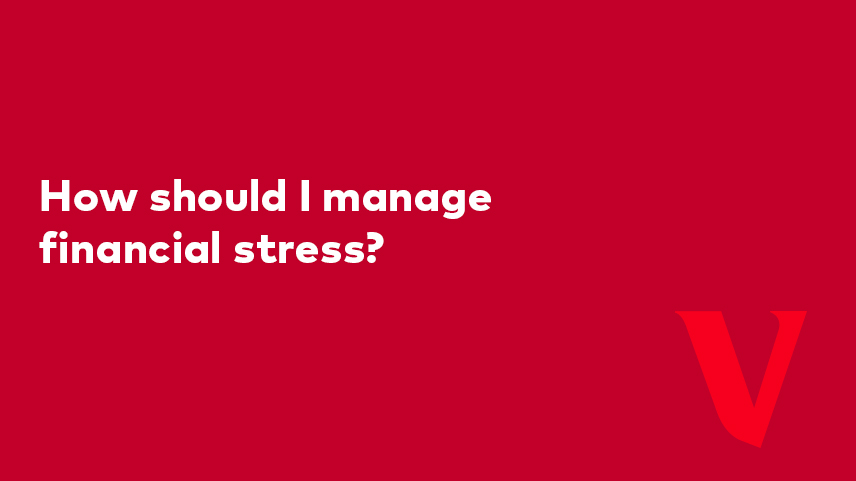
Video length: 2 minutes 10 seconds
Hi, everyone. I'm Kate Lauer, senior manager in Personal Investor at Vanguard.
I know market ups and downs can be overwhelming, and that can sometimes lead investors to make snap decisions.
But the key to managing financial stress comes down to 2 actions: staying true to your long-term goals and identifying when a decision is emotional versus strategic.
So first, let's focus on what you can control by revisiting your goals and making sure you're still on track. To do this, I always ask myself 3 questions.
First, can I cover emergency expenses, like a car repair? Two, am I saving enough for my retirement? And 3, are there any future expenses that I need to plan for, like my son's education?
These are the basics of a strong financial foundation, and they're still important even when the market is shaky. Staying calm and looking at the big picture is key here.
Data shows that investors who panic and sell at the wrong time often miss out on the recovery, which can really hurt their long-term gains.
In fact, investors who panic and move their portfolio into cash, and keep it there for a year, have an 87% chance of underperforming versus those who remain in a balanced portfolio.
Once you have a handle on what you can control, the next step is to recognize emotional versus strategic, well-thought-out decisions.
When the market drops, it is totally natural to seek safety for your investments. After all, this is your hard-earned money that you've invested toward your financial goals.
But one mistake investors often make is panicking and moving their portfolio to cash.
This can put you in a tough spot, because now you've locked in your losses, and you won't benefit when the market recovers.
You might also feel safer if you just stop investing. But again, this can keep you from reaching your goals.
So remember, name the emotion, and then manage it.
Focusing on your big picture and what you can control can help manage stress during volatile markets.
Whatever your goals, Vanguard is here to help support you with resources and professional advice to weather any storm.
What should I do in periods of volatility?
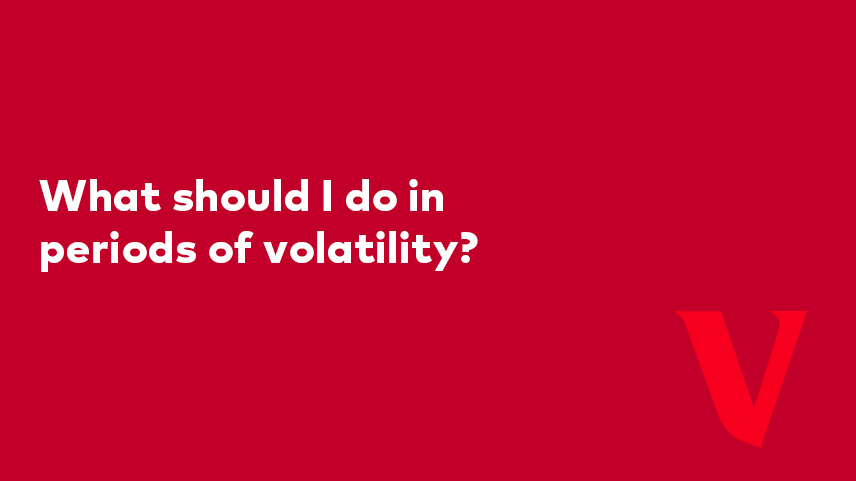
Video length: 2 minutes 33 seconds
Hello, I'm Randy Lee, senior manager in Advice & Wealth Management at Vanguard.
During an economic downturn, the fear of losing your hard-earned savings or veering off track on your financial plan—it's real.
While economic developments and market volatility are beyond your control, you can control your financial decisions and your long-term strategy.
So what can you do? First, ask yourself 2 key questions:
1. Have your goals changed?
Think about both short-term savings goals like buying a house or building an emergency fund, and long-term investing goals like saving for education, retirement, or investing in retirement.
2. Has your risk tolerance changed?
For example, if you've lost your job, or the likelihood of losing your job is higher, that might impact your ability to take risks.
In some cases, making changes to our goals and risk tolerance can make sense. But staying invested and avoiding the pitfalls of market-timing are of paramount importance to long-term investing success.
During periods of volatility, 2 key investing principles can really help.
First: balance. Broadly diversifying your portfolio can help you avoid big losses and stay aligned with your goals.
Even if you're already retired, the importance of diversification remains just as important.
Retiring at age 65 doesn't mean you're done growing or maintaining your wealth. You could live many years beyond retirement.
Second: discipline. The market has seen tough times before, like during the pandemic and the 2008 financial crisis. And staying invested paid off.
It's not easy, but history and investor experience shows that staying in the market has been better than trying to time it.
If you manage your own investments, sticking to your plan can be reassuring. If you have an advisor, lean on them for ongoing coaching, support, and financial planning.
And remember, the investment landscape is constantly evolving. This can be daunting.
But it's important to remember that you have more control over your financial future than you might think.
How can I incorporate mindfulness into my financial practices?
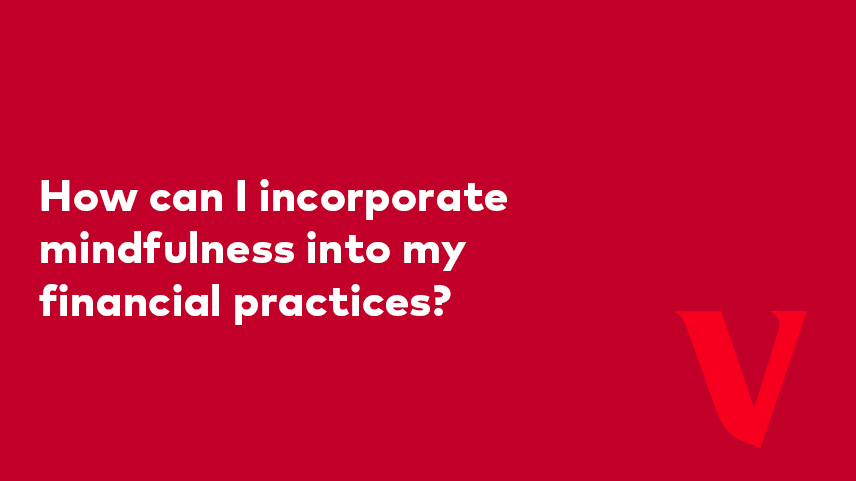
Video length: 2 minutes 20 seconds
Hi, everyone. I'm Kate Lauer, senior manager in Personal Investor at Vanguard.
Whether you've been investing for months or decades, quick changes in the market and uncertainty about what happens can be really hard to stomach.
However, the key to long-term success often lies in taking a step back and embracing a mindful approach.
Mindfulness is about being present and fully engaged. It's like hitting the pause button on your busy thoughts.
In investing, it means taking a step back and assessing your emotions, and aligning your actions with your long-term goals.
Financial wellness is a key part of your overall health and happiness.
I'm sure you've been in a situation where you've been financially stressed. I know I have.
It can lead to anxiety, and sleepless nights, and even physical health issues.
Mindful investing helps manage those stressors by fostering a deeper sense of understanding of your financial decisions, giving you a sense of control and stability.
Emotional decisions can hurt your chances of reaching your long-term goals. When the stock market dips, people often sell to avoid their losses. But this can be costly in the long run.
Instead, take a step back, and give yourself time to make a more thoughtful decision. Rather than acting on impulse, do something you find calming. For me, that might be getting a workout in or just going outside.
These small acts can help you regain your composure, so you can revisit the decision with a clear, fresh mind.
Once you've taken emotion out of the equation, revisit your goals, and dig into data on the broader market trends to gain a wider perspective.
Looking at a week, versus a year, versus a decade can paint a very different picture.
If you still have questions, you can always speak to a financial advisor who can not only help you put together a well-balanced plan but will help you stick to it too.
In a world of quick wins and instant gratification, mindful investing offers a refreshing change.
It encourages you to slow down, reflect, and make decisions that benefit your long-term interests.
Remember, mindful investing is an ongoing process that requires patience and discipline. By focusing on your well-being and making thoughtful, goal-oriented decisions, you can navigate the market with more confidence and peace of mind.
Should I change my asset allocation during periods of volatility?
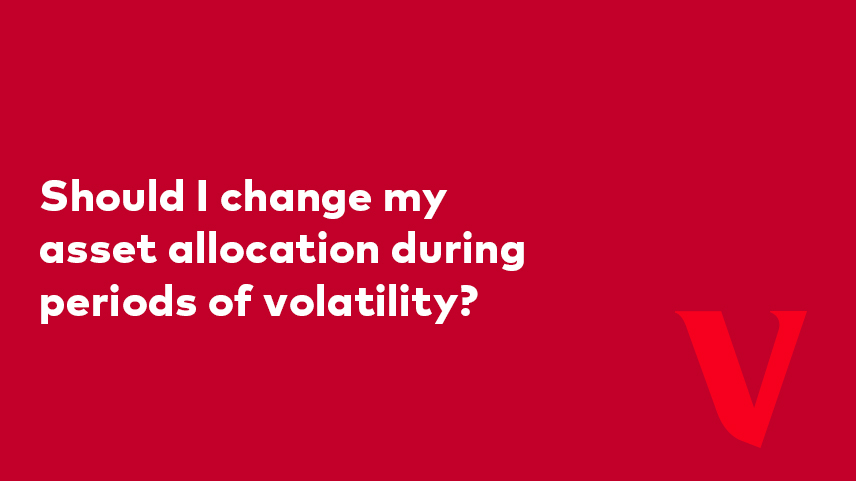
Video length: 3 minutes 05 seconds
Hi. I'm Alison Kerber, a senior wealth advisor at Vanguard.
I often hear a common question from clients, especially during times of market volatility: Should I change my asset allocation?
It's a crucial question, and today we'll explore 3 key strategies to help you navigate this decision.
But first, it's important to note that a solid, diversified financial plan that's built with your specific financial goals and risk tolerance in mind should be able to handle periods of market volatility.
It's not always easy, but history proves that staying the course is often the right thing to do.
Many of our clients who stuck to their plans during historic market declines—the dot-com bubble, the global financial crisis, and the COVID-19 market downturn—saw their portfolios recover and even grow over time.
There are strategies you can follow during downturns, however. First, it's important to reevaluate your goals and life stage. Often, the closer you get to reaching a specific goal, the better it is to choose a more conservative allocation, shifting toward bonds and away from stocks. This can help to better preserve your principal when swings occur.
For example, if your child is no longer 10 to 18 years out from college but is just 3 to 5 years and their college fund is still all in stocks, it might be worth considering a different asset allocation, regardless of market conditions.
Next, I suggest taking another look at your risk tolerance. If you find yourself extremely anxious during downturns, it might be a sign that your current allocation is too aggressive. A small adjustment can make a big difference.
Maybe it's adding a bit more cash for short-term reserves or slightly reducing your stock exposure. These minor tweaks can help you feel more comfortable with your long-term plan.
Finally, consider if it's time to rebalance your portfolio. It's important to review your portfolio on a regular basis to ensure it stays aligned with your long-term goals.
If you notice that your stock-to-bond ratio has deviated by 5% or more, consider rebalancing. This helps maintain the discipline needed to stay the course during volatile market conditions.
These 3 steps can keep you on track and help give you peace of mind. And remember, you don't have to go it alone. Reach out. We're here to help.
Are international investments smart amid the tariff environment?
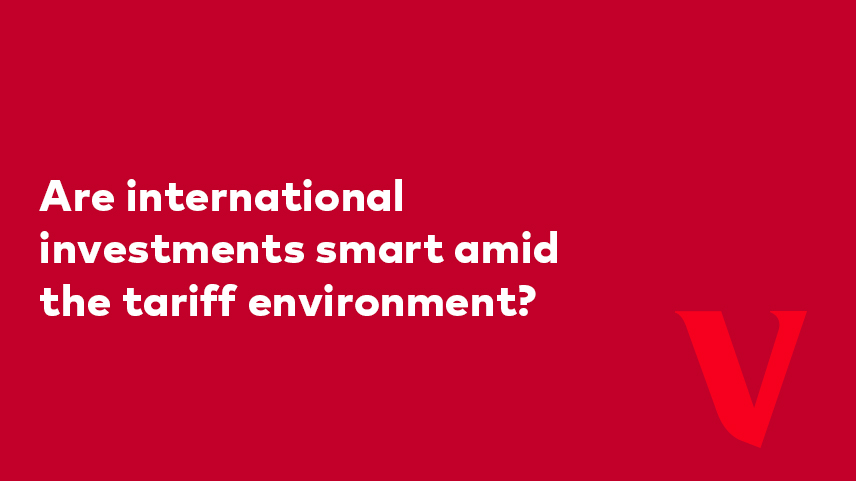
Video length: 2 minutes 41 seconds
Hi, I'm Kevin Khang, senior international economist at Vanguard.
Tariffs have been a hot topic lately, and it's natural to wonder how they might affect your global investments.
So I'm here to share some thoughts on the evolving tariff situation and how you can position your portfolio to navigate these challenges.
Developments around tariffs and trade policies have been dynamic and can change rapidly.
We anticipate that the uncertainty will continue to evolve for the better part of the upcoming year, with likely disruptions to supply chains and headwinds for business conditions, labor markets, and price levels.
We recognize that these variables can be concerning, and it's natural to have questions about how all these factors might affect your investments and financial plans.
So how should investors evaluate U.S. and international equities in today's climate?
Well, we came into the year having experienced a period of American exceptionalism, with big tech companies driving strong market performance. It seemed as though this trend would just continue. And as a result, certain tech stocks were rewarded with high valuations, leaving other types of stocks out of the limelight.
This has created a dichotomy between richly priced U.S. tech-centered equities and much more reasonably priced international equities.
And through the volatile months of March and April, we saw how vulnerable U.S. equities can be when it started to look like tariffs would have a real impact on the economy and corporate earnings.
No matter where things land, there are some practical steps you can take.
First, rebalance your portfolio to follow your investment plan. If it is too heavily weighted in U.S. stocks, consider adjusting your portfolio to add more international stocks.
Next, diversify by region. Don't put all your eggs in one basket. Invest across different regions, like Europe and Asia, to spread risk.
As you do this, focus on value. U.S. tech stocks are expensive, but international stocks and even domestic U.S. value stocks might offer resilience and better long-term potential.
Finally, stay informed. This is a highly fluid environment in terms of trade and tariff policy developments. But don't let the headlines get the best of you. Seek out expert insights to help you navigate the changes and reaffirm your conviction to stay the course.
And remember, we're always here to help you prepare for the future ahead.
Should I move to cash when markets are volatile?

Video length: 2 minutes 31 seconds
Hi. I'm Sonia Fraher, head of cash management at Vanguard. When the market is shaky, you might wonder if moving to cash is a worthwhile strategy.
While moving to cash when the markets dip can provide a sense of security and reduce immediate risk, it also comes with potential drawbacks.
Nobody can predict where and when the bottom is, and you don't want to sell out of the market at an inopportune time.
And if you sell, you might miss out on the recovery when the market rebounds, as it always has in the past.
It's also important to consider the tax implications of selling investments to move to cash.
While you could use any losses to offset gains, you may also owe taxes on any profits.
But there is a time and place for cash within a well-diversified portfolio. It's important to have cash set aside to cover unexpected financial needs.
But the reality is that nearly two-thirds of Americans feel uneasy about their emergency savings.
A solid emergency fund, which we know can be challenging to build, acts as a financial and emotional safety net.
Having an emergency fund can make you feel more prepared and in control, especially when it feels like everything else is out of your hands.
It's always crucial to have enough cash or cash equivalents, such as money market funds and Treasury bills, to cover your short-term and medium-term spending needs—without disrupting your long-term investments.
This helps you avoid the temptation to sell assets during market downturns, which can lead to significant losses.
Whether you're starting out or boosting your emergency savings, planning for short- or medium-term goals, or moving investments into cash, the Vanguard Cash Plus account might be a good option for you.
Cash Plus's sweep program offers a higher APY compared with traditional, low-yielding savings accounts, making it a valuable part of a diversified portfolio.
Cash Plus's sweep program is FDIC insured, so your funds are secure. And with Cash Plus, you have easy access to your funds, making it an ideal solution for effective cash management and short- to medium-term savings.
By successfully diversifying your portfolio, maintaining a solid emergency fund, and considering options like Vanguard Cash Plus, you can help safeguard your financial health and gain reassurance knowing you're ready for whatever comes your way.
Is a market dip a good time to buy equities?
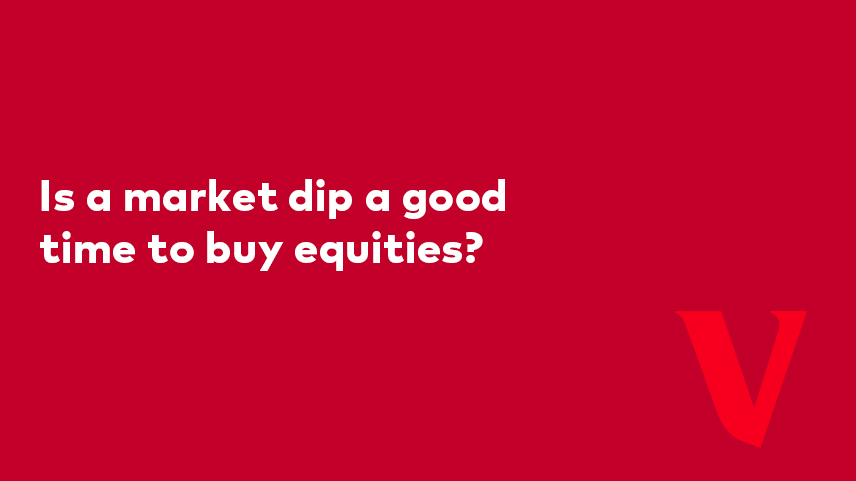
Video length: 3 minutes 22 seconds
Hi, I'm Kevin Khang, senior international economist at Vanguard.
If you're thinking about buying or selling equities during a market downturn, a good place to start is by fully understanding your risk tolerance.
But first, make sure you're considering those moves for the right reasons and for the right time horizon.
The last 15 years may have given you the idea that "buying the dip" always gets rewarded quickly and handsomely. But that's actually not the norm.
It may come as a surprise, but the downturn triggered by the COVID-19 pandemic in 2020 and the bear market of 2022 were 2 of the shortest bear markets in history.
Buying the dip in these environments led to a quick gain, but earlier decades show that drawdowns can be deeper and longer than what we've experienced recently.
A typical drawdown between 2000 and 2010 lasted more than 3 years. Someone buying the dip back then would have had to wait a while and ride out further losses before eventually seeing gains.
Fortunately, history shows us that the market does eventually recover from downturns in the long run.
But it's important to make sure your expectations are realistic when you buy the dip.
Along with having a clear understanding of the potential outcomes, you also need to know how much risk you can handle. When the market performs strongly for several years, it may make you think you can tolerate more risk than you really can.
And if you initially decided how much risk you could handle during good economic times, that assessment may not fully reflect how you'll react in a more challenging market, leading you to feel caught off guard during periods of volatility.
The good news is that it's never too late to reassess and adjust. Small changes, like increasing your cash reserves or slightly lowering your stock exposure, can go a long way toward helping you feel more comfortable with your portfolio.
Once you have a realistic expectation for the drawdown and a well-rounded understanding of your risk tolerance, you can decide what to do with your equities in times of volatility.
Equities are, by nature, subject to significant fluctuations. While they do offer the potential for high returns, they also come with higher risk.
So first and foremost, you should make sure you have a financial plan that's aligned with your goals, time horizon, and risk tolerance. And once you've done all that, remain committed to it.
Remember, staying the course is what helps you achieve your long-term goals, even in times when markets are volatile.
But if you're comfortable with the risk, it could be a smart choice to pick up more equity exposure at a discount—as long as you can remain patient through the downturn.
As you consider whether to buy or sell equities during market volatility, take a moment to reflect on your risk tolerance and decide if your current plan is still the right fit.
With regular reviews and slight tweaks along the way, you can build a sound strategy that can help you stay confident in any market.
What do I do if I'm nearing or entering retirement in a downturn?
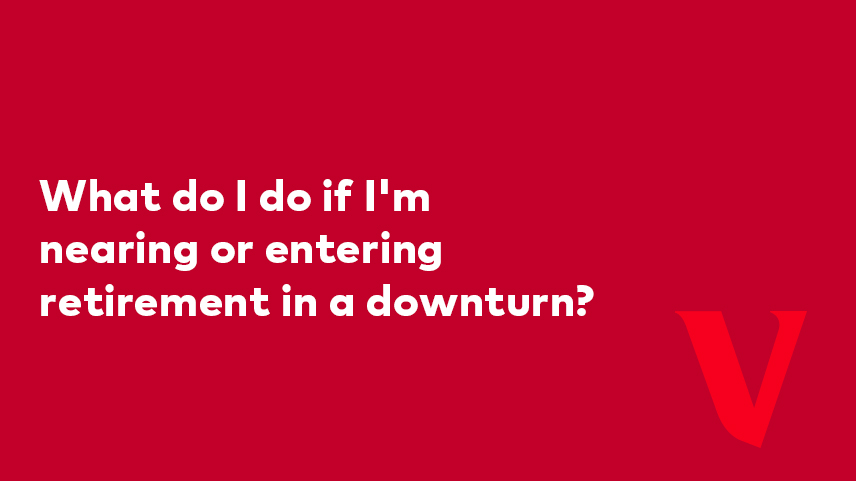
Video length: 3 minutes 9 seconds
Hello. I'm Kelly Hahn, head of retirement research at Vanguard. We understand that market volatility can be unsettling for everyone, but especially for those who are nearing or in retirement and depend on their portfolios to generate income.
But remember, downturns are a natural part of the economic cycle. And there are things you can do to remain in control of your finances.
First, it's all about adapting and being flexible. Examining and reducing spending as much as you can during these volatile times will help alleviate the instinct to sell and lock in market losses.
Instead of withdrawing a fixed amount from your portfolio like the traditional 4% rule, consider adjusting the amount based on how well the market is doing. This is known as a dynamic spending strategy, and it will help conserve your portfolio over the long term.
For example, when your portfolio value is higher, you might consider withdrawing 4 to 5%. And when your portfolio value is lower, you might drop your withdrawal rate down to somewhere between 2 to 3% to preserve your investments and to avoid selling at a disadvantage. This helps your portfolio recover when the market eventually improves.
But if you do need to sell part of the portfolio during times of market volatility to meet your essential spending needs, be selective about how you do it.
Look at investments that have grown in value over time and consider selling those. Or sell investments at a loss to offset realized gains when you file your taxes.
And be sure to consider how long you've held the investment before you sell them. Profits on investments you've held for more than a year are subject to long-term capital gains rates, which are generally lower than regular income tax rates. And when you sell investments you've held for less than a year, any gains are taxed as ordinary income.
But above all, remember that it's not the best idea to try and time the market—because when it falls, it tends to bounce back pretty quickly. And missing the good days in the market that often follow a downturn can have a dire impact on your portfolio's long-term value.
So instead, stay the course. But that doesn't necessarily mean set it and forget it.
Consider rebalancing as needed to maintain your target allocation and meet your long-term goals. And if you're still unnerved based on market volatility, your risk level might need adjusting.
Finally, make sure you keep enough in cash or cash-like investments to cover your spending needs and emergencies. During market downturns, don't let fear paralyze you or cause you to act impulsively. Be proactive, stay informed, and seek advice if you need it.
Remember that you're in control. By being flexible and making informed decisions, you can build a resilient financial foundation that's designed for your long-term success.
What strategies can I use to protect against downside risk?
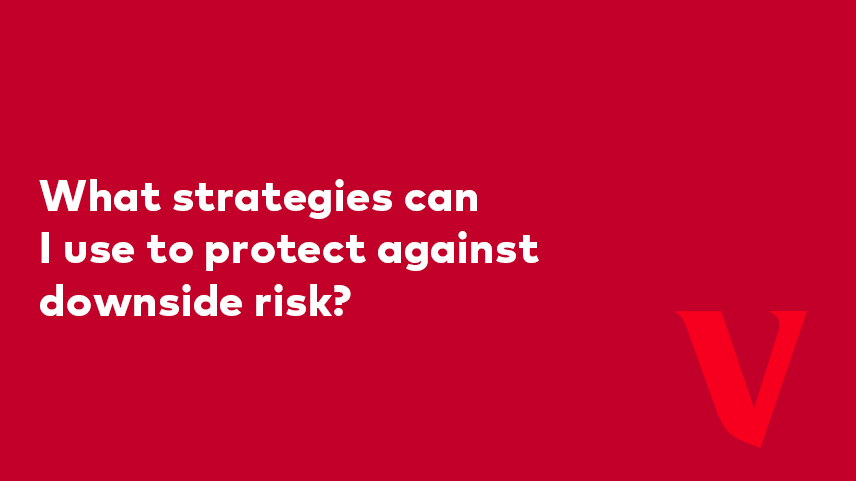
Video length: 3 minutes 41 seconds
Hi, I'm Ariel Finegold, head of investment product strategy. So, here at Vanguard, we know that as your investments grow, your needs and your goals can become more complex. And I'm here with a few strategies to help smooth the ride and keep you focused on the long term.
Let's start with your first line of defense—diversification. By spreading your investments across equities and fixed income, alternatives, and cash, you can reduce the risk of being overly concentrated and thus exposed to any one segment of the market.
Next, let's talk about the importance of maintaining liquidity. Whether you are taking advantage of an investment opportunity or covering a large expense, and you don't want to sell any appreciated assets, having access to liquidity is crucial. It can help provide both protection and flexibility, ensuring you have working capital for your broader portfolio and your broader financial life.
For example, Vanguard's Cash Plus account's sweep program offers a higher APY compared with traditional low-yielding savings accounts. It also features the option to diversify into any of five money market funds within the account, including municipal money market funds, which have the potential to provide attractive tax-exempt yields.
Now, for those who are interested in more advanced strategies, Vanguard supports the use of options on our platform, though you should have knowledge of how they work and be approved to trade them first. Options strategies provide a targeted way to control risk if you want more precision.
Additionally, our new Fully Paid Lending program allows Vanguard to lend out your in-demand securities to potentially earn you additional income, which would be paid to you monthly. Certain shares may be in high demand during market stress, so this can be a very low-effort way to potentially offset volatility-related losses.
If you're willing to trade off some liquidity in exchange for the potential for higher returns and enhanced diversification, private equity may help smooth out performance and reduce the impact of market swings.
And the factors that drive private equity returns can be less correlated with the broader equity market as well.
Vanguard partners with HarbourVest, a world-class global private equity firm, to access a distinct and growing segment of the market.
Finally, and perhaps most importantly, the best strategies can be undone by emotional decision-making.
You must stay focused, block out the short-term noise, and avoid making any reactionary moves. Now, across the strategies I just mentioned, we are here to help you manage risk, preserve flexibility, and support your long-term success, especially in uncertain markets.
How do active funds fare in down markets?
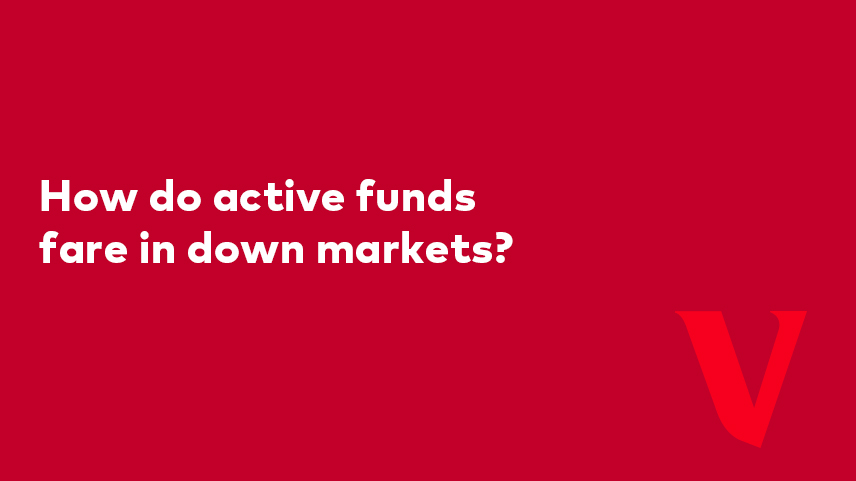
Video length: 2 minutes 44 seconds
Hello, I'm Kelly Hahn, head of retirement research at Vanguard.
We understand that market downturns can be really unsettling and raise concerns about the safety and growth of your investments. And many investors wonder how active funds may fare during these challenging times.
Active stock funds are carefully managed by skilled professionals and, unlike index funds, rely on the portfolio manager's discretion in selecting investments—and this can be really beneficial during market downturns.
Fund managers actively choose what they believe will perform well within the fund's mandate, usually based on company performance and market trends.
Yes, the fund performance will depend on the portfolio manager's investment expertise. But adept managers can navigate market volatility and identify undervalued investments.
And just like active stock funds, active bond funds also rely on skilled professionals to make their bets.
And in the fixed income space, lower costs are a big advantage. They mean that fund managers don't need to achieve as high a return to cover their expenses, which gives low-cost active fund managers more flexibility to take selective risks.
And usually they're looking to buy and sell based on factors like interest rates and credit conditions.
So you may wonder which type of active fund is best. Well, it all depends, but the key is to build a solid diversification strategy. And what that means is spreading your money across different investments. And, that way, if one doesn't do as well in certain conditions, the impact on your overall portfolio isn't quite as big.
Your asset allocation, including any active funds you invest in, should be based on your short-term goals, long-term goals, as well as risk tolerance—so make sure you have a clear picture of all of those three components.
And a good time to choose active funds is when you think a skilled fund manager can make smart investment choices that will add value to your portfolio. You should research which active funds and fund managers are best for your portfolio and make selections based on your level of confidence.
It's very natural to feel concerned about the impact on your investments when the market hits a rough patch. But by incorporating active funds into your portfolio, you can leverage the opportunity they provide to diversify, adapt to market conditions, and potentially achieve better performance over time.
Our market volatility hub provides Vanguard's latest perspectives and insights to help you manage your assets and stay focused through turbulent times.